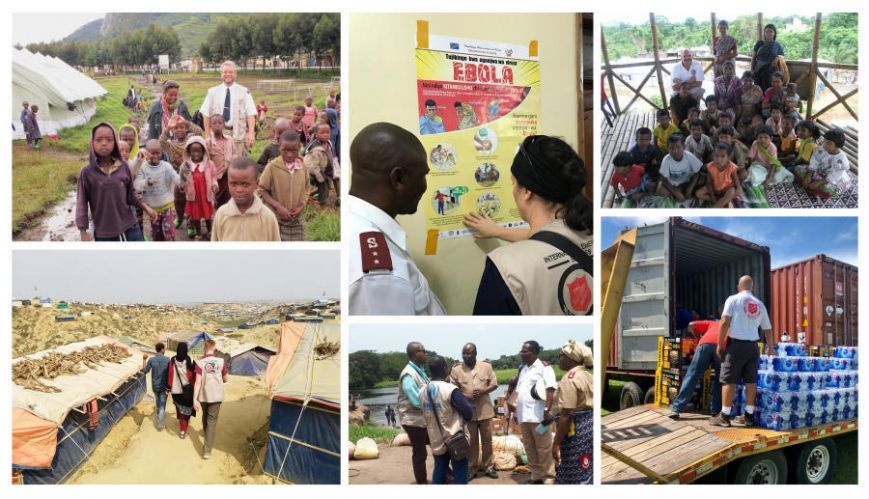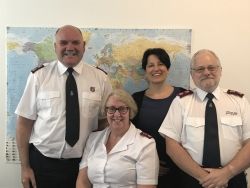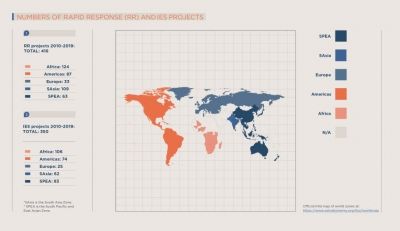In the eye of the storm

In the eye of the storm
28 May 2020
From floods, earthquakes and tsunamis, The Salvation Army's International Emergency Services is at the centre of the Army's disaster response around the world.
The Salvation Army International Emergency Services (IES) has been providing support and assistance to territories, commands, regions and other countries affected by disaster and conflict for the past 25 years.
From floods, earthquakes and hurricanes to tsunamis and economic crises, IES, in partnership with other organisations, has provided trained staff and volunteers to support, coordinate and facilitate emergency relief and rapid response operations in challenging circumstances. It also offers training and resources.
As the world experiences the COVID-19 pandemic, IES is also assisting in the response through its trained local personnel and coordination of resources in more than 50 different projects globally. To see more on this response, click here.
 The IES team (from left): Major Drew Ruthven (Strategy, Security, Program Officer), Major Alison Thompson (Coordinator), Damaris Frick (Deputy Coordinator) and Major Chris Mulryne (Administration).
The IES team (from left): Major Drew Ruthven (Strategy, Security, Program Officer), Major Alison Thompson (Coordinator), Damaris Frick (Deputy Coordinator) and Major Chris Mulryne (Administration).
Under lockdowns, travel and other restrictions globally, IES continues to assist in a range of countries, including earthquake and tsunami relief in Indonesia, Hurricane Dorian response in the Bahamas and material aid in the Venezuelan economic and political crisis.
IES focuses on meeting immediate needs, building resilience and resourcefulness in others and empowering people affected by disasters and conflict around the world to live with dignity and hope.
Australian Salvation Army officer Major Drew Ruthven, (see Others magazine May 2020) serves in the IES Program Office, with a focus on Strategic, Security and Field Support. It’s a challenging role that sees Drew based in both Melbourne and at the Army’s International Headquarters in London.
When disasters occur, there is often a need to support impacted Salvation Army territories or mount a response by deploying international emergency teams. IES relies on the generous support of many territories and is grateful to have personnel who are well trained, experienced and available to deploy.
“When there is a natural disaster in a territory, the team contacts that territory to see whether they require any assistance in their emergency response and to let them know of the team’s availability,” explains Drew. “We only get involved if we are invited and if the event goes beyond the territory’s capacity to respond.
“We are in a unique position in the international NGO (non-government organisation) world, in that The Salvation Army is already in many of the countries where disaster strikes, has local contacts, is trusted and can mobilise resources quite quickly.”
Worldwide Impact
The Salvation Army International Emergency Services have been making an impact in communities around the world for a quarter of a century. In the past decade particularly, the number and variety of responses and projects has grown, with the training of personnel and development of partnerships also increasing. Here we provide a brief snapshot of some of those projects, as well as what motivates this important ministry.”

Biblical Mandate
- “Emergency response and helping others without imposing conditions is clear throughout Scripture and we strongly hold on to that,” says Drew. “That’s part of why I love my role – I get to see local communities responding in faith and the Army at its best.”
- IES is committed to playing its part in fulfilling God’s purpose for his world by responding according to the pattern described by Jesus when he commended those who give aid to others: “Truly I tell you, whatever you did for one of the least of these brothers and sisters of mine, you did for me" (Matthew 25:40).
- The Early Church when it provided help for those affected by a Judean famine: “The disciples, as each one was able, decided to provide help for the brothers and sisters living in Judea” (Acts 11:29).
IES Philosophy
The work of the IES section is built on a rights-based and people-centred approach, which leads to a disaster response according to needs of the affected community. It works to a set of internationally recognised standards based on the principles of humanity, neutrality,
impartiality and the humanitarian imperative, recognising the rights of all people affected by disaster or conflict. These common principles and rights are perhaps best reflected in the following summary:
- The right to life with dignity.
- The right to receive humanitarian assistance.
- The right to protection and security.
IES encourages a strong link between relief, recovery and long-term development with a focus on Disaster Risk Reduction.
For more information on IES, click here.